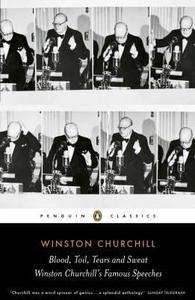Blood, Toil, Tears and Sweat
Winston Churchill's Famous Speeches

Editorial Penguin UK
Fecha de edición octubre 2007
Idioma inglés
EAN 9780141442068
416 páginas
Libro
encuadernado en tapa blanda
Resumen del libro
The most eloquent and expressive statesman of his time - phrases such as 'iron curtain', 'business as usual', 'the few', and 'summit meeting' passed quickly into everyday use - Winston Churchill used language as his most powerful weapon at a time when his most frequent complaint was that the armoury was otherwise empty.
In this volume, David Cannadine selects thirty-three orations ranging over fifty years, demonstrating how Churchill gradually hones his rhetoric until the day when, with spectacular effect, 'he mobilized the English language, and sent it into battle' (Edward R. Murrow).
Biografía del autor
x{0026}lt;span x{0026}lt;span style='font-size:13.3333px;' ?Winston Leonard Spencer Churchill (Blenheim Castle, Oxfordshire, 1874-Londres, 1965), proveniente de una familia aristocrática victoriana, se graduó en el Royal Military College. Tras haber servido en la India, presenció la guerra anglobóer como corresponsal de guerra del periódico Morning Post. En 1900 fue elegido diputado por el Partido Conservador, que abandonó en 1904 para unirse al Partido Liberal. x{0026}lt;/span x{0026}lt;/span x{0026}lt;span x{0026}lt;span style='font-size:13.3333px;' El gran salto en su carrera política se produce en 1940, cuando es elegido primer ministro en sustitución de Neville Chamberlain. Después de perder las elecciones en 1945 contra los laboristas, recuperó la jefatura del Gobierno durante el periodo comprendido entre 1951-1955. Tras dimitir ese año, se dedicó a la pintura y la literatura, campo en el que destacó con obras como Paso a paso: del crepúsculo de la paz al resplandor de la victoria, Sangre, sudor y lágrimas, Los secretos de la guerra, Pensamientos y aventuras y Savrola. x{0026}lt;/span x{0026}lt;/span x{0026}lt;span x{0026}lt;span style='font-size:13.3333px;' En 1953 se le otorgó el premio Nobel de Literatura. x{0026}lt;/span x{0026}lt;/span x{0026}lt;p x{0026}lt;br x{0026}lt;/p x{0026}lt;/span








